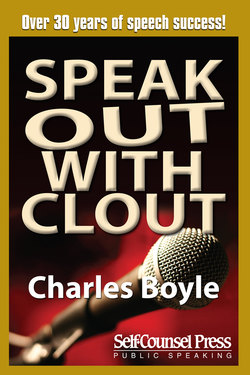Читать книгу Speak Out With Clout - Charles Boyle - Страница 8
На сайте Литреса книга снята с продажи.
For the Companies and Causes
ОглавлениеSpeeches can be, and quite often are, the catalysts for immediate or long-range success. Advertising can sell a product and even an idea, such as conservation, if continued over a long period. News coverage, depending on the magnitude and degree of public participation needed, is also necessary for success in promoting causes. Speeches are the vehicles used to get the media coverage necessary to express the company’s side of an issue.
A specific example of a company using a speech for a cause is the battle between the phone companies and the private carriers that was rampant in the 1970s. Actually, this controversy involved the entire phone industry and its unions on one side arrayed against private companies getting into specialized phone service on the other side, with the FCC and Congress in the middle. There were many phone companies in America. The private companies saw long-distance telephone service as a moneymaking enterprise, which it was. They wanted a piece of the action. By setting up service between low-cost, high-volume routes such as Chicago to New York, they could keep their rates low and still make a lot of dough. The Federal Communications Commission thought this competition to lower rates was a good idea. The phone companies argued that the whole thing was unfair because they had to provide long-distance service for low-volume, high-cost routes between all the small towns, as well as between the profitable big cities. Furthermore, phone companies argued that the profits they made on the lucrative long-distance rates helped to hold down the cost of home telephone service, which was provided, according to the phone companies, below cost.
Now, if the whole argument between the regulated phone companies and the private Specialized Common Carriers (SCC) was as simple as the explanation I just used, AT&T and the other phone companies could have saturated television and radio with commercials explaining the problem, in so doing gain the public support needed to get Congress to overrule the FCC. But it wasn’t that simple. First of all, most people thought phone rates were too high and the phone companies were too big and rich. It was unlikely that public support for the monolithic industry would have come from an announcement saying competition from non-telephone companies was unfair.
Companies had to show, by comparison and by providing a brief history, how they provided the best telephone service at the lowest cost in the world. This approach required more time than a brief commercial. It required a tightly written speech giving a brief history of the system, how and why it became what it was, and how the service and cost to the consumer compared with other countries. The speech could take as little as 15 or 20 minutes to give with time left at the end for questions from the audience.
The speakers who gave talks like these used to be telephone company employees volunteering their time to tell the story of their industry. Hundreds of these employees gave similar speeches throughout the country to thousands of people and urged their audiences to write to their congressman or congresswoman about this issue. Furthermore, newspapers occasionally printed excerpts of these speeches, thereby reaching additional thousands of people. The speakers bureaus for the phone companies also had speeches on other subjects concerning the phone industry and a few speeches that were completely unrelated to the telephone.
The purpose of giving these speeches was to perform a public service while at the same time affording the public an opportunity to question representatives of what appeared to be a giant, faceless institution. It’s easy to get angry with a large company, particularly monopolized utilities; it’s a lot harder to get angry with a human being who works for one of those companies when he or she is making an effort to answer your questions and solve your problems. And that’s where speeches come in: face-to-face communications, time to present more information, and the opportunity to receive and answer questions.
No other form of mass communication can reach the public with all of the effectiveness of good speeches. There are three unique aspects about speeches:
• Unlike the “remote visibility” of television or the Internet, a speaker is present, visible, and represents reality.
• A speaker is demonstrable evidence of real concern for the audience and its needs.
• A speech before a live audience is the surest way to get a feel for what the public really thinks and how it responds to what is said.
